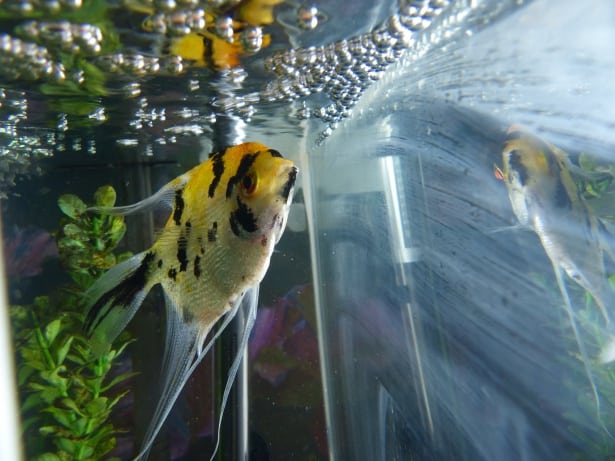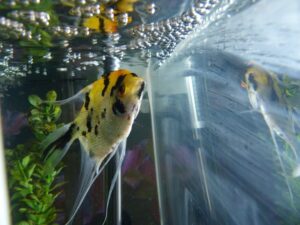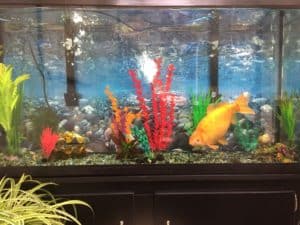As a fish veterinarian, I am frequently asked about fish personalities. Well, although no scientific studies have been done, and honestly, I’m not sure how it would even be attempted, from my 10 years of experience, fish absolutely have personalities, with various fish behavioral quirks. Fish personalities can vary widely and many do not stick to the “traditional” expectations set for various fish species. For example, some goldfish like to have friends, while others prefer to be only children and will beat up any other fish, or invertebrate, or odd decoration, that gets put in the tank with them. Betta females are supposed to school together, but some seem to act like males and want nothing to do with other bettas, but like other species. We get it; fish are weird!
Fish Personalities: Schooling Together vs. Stand Alone
There are many fish in the pet trade that are known for certain behaviors and/or characteristics. At least, most of the time. Schooling fishes, such as neon tetras and koi, like to be in a group and do not do well on their own. We have seen many lethargic koi when they are all alone in their pond. This may have originated from many fish species being prey animals and sticking to a large group gives predators the false image of a larger individual, rather than many small ones.
However, we have found that these type of fish are happy to school with many other fishes, not necessarily just their own species. Koi, for example, will school with goldfish. (Yes, they can absolutely be kept together.) Neon tetras will school with other tetra and small fish species, creating a diverse school.
Other fish species, such as those in the damselfish family, need their space. Damselfish will viciously defend their territory against other fish and owners’ hands. These fish have adapted over time to be highly aggressive, despite their small size, in order to get their fair share of resources.
And there may be species who are supposed to be more community minded and just didn’t get the memo. Angel fish are an example I have experience with first hand. Sure, most of them get along with other fish and members of their own species, but some individuals just have to be bullies, nipping at the fins of their tankmates and shoving them into a corner. What to do with a fish bully? They’re moving to their own tank!
Goldfish can flip the script in either direction. Some are very happy in a school, whereas others can’t stand any other tankmates. We have found that some goldfish, if kept as a single fish for a long period of time, tend to react poorly to new fish additions, particularly smaller ones. They will lunge and push around the other fish, eat all the food, and generally make their lives miserable. But this isn’t the case all the time. As we caution owners who are looking to get a friend for their solitary goldfish: do not expect things to go smoothly.
But for koi, we have NEVER seen one do well on their own. Two-koi ponds, that only have two fish, can be very closely bonded and if something should happen to one of those fish, they will act depressed (lethargic, decreased appetite, etc). Being alone can then make things worse since they get stressed when alone. Don’t rush to add fish without quarantine, however, or you may bring along their demise faster than you realize.
Competition for Resources: Feeding Time Hierarchy
During competition for resources, a fish’s primitive nature will shine through. Whether it’s space, food or mates, all fish have to respond to their basic instincts. When it comes to feeding time, however, you may notice that some fish charge towards their food while others may shy away. This can be a species difference, with more aggressive species, usually with larger bodies and mouths, responding instinctively, while smaller species hang back or dart through the larger individuals. It can also be an individual preference, which we see with many koi ponds.
Some koi ponds have laid back feeding times, while others, it’s a mad rush to the food. Now, this could be temperature dependent, since colder ponds have decreased metabolic activity, or resource based, with some ponds not being fed enough to go around. But it can also be the fish’s own temperament. This can be very confusing for koi owners who think their fish should respond actively to food, and then take 10-20 minutes to slowly eat. It takes time to learn what is normal for your pond and if you are concerned, contact your aquatic veterinarian.
How Can I Tell If My Fish Are “Normal?”
When it comes to telling if your fish are “normal” or not, there is a lot left open for interpretation. Certainly not all fish species read the book on how they are expected to behave and can cause distress for owners. Keep in mind that fish personalities and behaviors can vary widely throughout a species and not all fish will be amenable to their owner’s desires. It is your job as a fish owner to make your fish happy and provide them with a suitable environment, perhaps despite their personality quirks.
If you are concerned about a behavior, here is our presentation on Spotting Disease in Fish, covering both physical and behavioral signs of disease.



